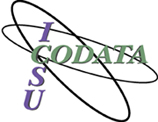International Council for Science : Committee on Data for Science and Technology
![]()
< home > < newsletter > < discussion list > < data science journal > < contact > < members area >
C O D A T A
CODATA National Member:
JapanScience Council of Japan
Chair/Delegate: Prof. Akira Nagashima
Japan National Committee (JNC/CODATA) is organized by the Science Council of Japan. JNC/CODATA is also sponsored by the Japan Society of Information and knowledge. Dues for Japan membership in CODATA are paid by the Science Council.
Vice Chairs:
Prof. Shuichi Iwata
Dr. Takashi Kunisawa
Members:
Prof. Hiroyuki Aburatani
Prof. Eiichi Ito
Prof. Yoichi Iwasaki
Prof. Kanji Ueda
Prof. Sinsuke Sakai
Prof. Motoyuki Suzuki
Prof. Tomoko Nakanishi
Prof. Hiro Hamaguchi
Prof. Sinji Hara
Prof. Tetsuo Mori
2. National Committee Activities
JNC/CODATA has been engaged in seeking measures to activate database activities in Japan. Several meetings were held, and existing problems and possible solutions were discussed, which are summarized below.
1 Necessity of Effort for Database Development An enormous amount of data have been generated and utilized in education, administration, industry, etc. Unfortunately, however, the priority for database
development is assessed improperly low; the use of existing databases tends to be considered more efficient than the de nono development of a database. Efforts to develop databases should be assessed as important as those to produce data, and necessary means for man-power and budget should be taken for collection and dissemination of data.
2 Concern for Open Access It is still insufficiently accepted that publicly-funded data should be openly and fully available to the public after a specified period of exclusive use by the data producer. Such symposiums or workshops as organized by CODATA/ICSU/UNESCO are required in order to enhance general concerns for the international movements toward open access.
3 Needs for a Long Term Support Data collection/dissemination are actively performed in various fields of research. It would be important to establish an evaluation/support system for databases required in the advanced science and technology in addition to the currently running databases. A long term governmental support should be given to databases that are evaluated high.
3. World Summit on the Information Society (WSIS)
JNC/CODATA had worked closely with the Science Council of Japan (SCJ), in particular with Prof. Yoshikawa (the former president of SCJ/ICSU), to prepare scientific action plans for WSIS and to promote access to scientific data and information. The close collaboration is continued with the current president of SCJ, Prof. Kurokawa, for the Tunis Summit in November 2005.
4. Database Directories
Extensive directories of databases developed in Japan have been available on the Internet (http://www.nii.ac.jp/survey/dbdr.html; http://center.stelab.nagoya-u.ac.jp/ rigakunet/rigakunet.html). Therefore, this Report focuses on databases of molecular biology.
DNA Data Bank of Japan (DDBJ) at the National Institute for Genetics is developing nucleic acid databases in collaboration with GenBank in US and EBI in Europe. Currently the database contains 32,000,000 entries (3.8 x 1010 base pairs). Data accumulation is explosive and 16,000,000 entries (1.9 x 1010 base pairs) are supposed to be stored in the year 2004.
With respect of amino acid sequence database, SwissProt and PIR agreed to develop a unified database Uni-Prot in the end of 2003. DDBJ decided to participate in the international collaboration Uni-Prot and sent annotation people to EBI in 2004.
Protein Research Institute at Osaka University is collecting protein structure data in collaboration with Protein Data Bank (PDB).
The Microarray Gene Expression Data (MGED) developed a standardized MIAME, for promotion of activities of gene expression data. DDBJ is also responsible for the gene expression data.
In addition to these, nucleotide polymorphism databases that are expected to be useful for clinical purposes, and protein-protein interaction databases are being developed.
5. Promotion of Intellectual Infrastructures
Committees at the Ministry of Economy, Trade and Industry and the Ministry of Education, Culture, Sports, Science and Technology have been working to promote formation and dissemination of basic information (mainly numerical data) including standards, standard substances and databases. Focused areas cover measurement standards, material data, hazardous chemicals, geographical data, bio data and human behavior data.
Prof. Akira Nagashima
Japanese Delegate to CODATA
Working to improve the quality, reliability, management and accessibility of Data for Science and Technology
| home
| about
| codata membership
| resources
| task and working groups
|
| archives | newsletter | contact
| members area |
| ![]() | RSS Feed subscription instructions |
| RSS Feed subscription instructions |
